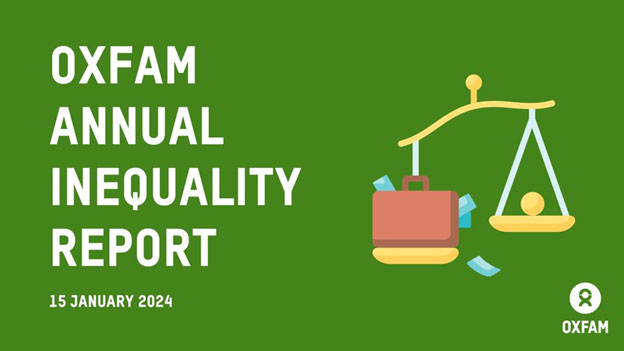
Governments allowing super wealthy to supersede us
Report shows the glaring inequality in Europe.

Oxfam’s latest report, INEQUALITY INC: How corporate power divides our world and the need for a new era of public action has laid clear the seismic divide between billionaires gaming the system, and the rest of society. While the rising inequality in Europe and globally should not come as a surprise, the scale of this injustice, and the unfathomable volume of wealth accumulated by so few, is difficult to process.
The recent growth in the divide is immediately referenced, with the report highlighting that “the wealth of the world’s five richest billionaires has more than doubled since the start of this decade, while 60% of humanity has grown poorer”. Noting that at the current rate poverty will not be ended until 2264. Making clear the risk of a continuation of the context that has made this possible, Oxfam make evident the binary choice between the delivery of true public power, or accepting our descent into a billionaire ruling class.
Through all this startling data, opportunities exist to break the link between extreme wealth and corporate power. Delivering a more equitable economy and society for working people will require a number of large changes, many of which can be mandated at an EU-level. Given the concentration of wealth in the Global North, the huge percentage of corporate profiteering, and the fact that in Europe, the richest 1% own 47% of wealth, Oxfam recommend a number of actions to turn the tide in our favour:
- Revitalising the state and secure its role as a provider of public goods
- Regulating corporations to prevent injustices in supply chains, empower workers and break monopolies
- Reinvent business to remove shareholder greed and prioritise equitable business models
“Calls made by trade unions to prioritise the creation of a social economy that works for the people have been heard, but not implemented, with Oxfam’s latest report showing the scale of the challenge ahead. Austerity and privatisation will only further drive inequality in Europe and globally”
The role of the trade unions in countering austerity and privatisation is well-known, with the underfunding of public services and infrastructure resulting in a widening gap between rich and poor, low-confidence in national governments and an increase in support for the far-right throughout the EU. As the representatives of professionals and managers in the EU, we have been clear in our opposition to the reintroduction of these actions. Europe’s fiscal rules must categorically eliminate the return to these policies in the face of economic difficulties, with an investment in people the only viable solution to the challenges presenting the economies in the 27 national capitals.
Initiatives such as the Corporate Sustainability and Due Diligence directive have shown that there is an appetite from the European institutions to protect environmental and human rights throughout company supply chains and to curb unsustainable investment. Throughout our advocacy activities in this file, we have seen the prominent role professionals and managers will play in the transposition and implementation of this text when it is delivered. Despite the positivity in securing this text, we have seen the European Council take damaging positions to dilute such a significant file throughout the process, emphasising how far we have to go. In incorporating action against union-busting measures, guaranteeing living wages for workers and massively increasing the taxes paid by multinationals, reining in corporate abuses can be successfully achieved.
Public procurement must also come under the spotlight, with Oxfam asserting that “no economic aid or government contracts should be given to companies that are missing their net zero targets, paying below living wages, or dodging taxes”.
Reacting to the publication of the report, Eurocadres President Nayla Glaise said: “While the swell of inequality dominating global economies does not come as a surprise, Oxfam have painted a bleak picture of where governmental priorities lie. Calls made by trade unions to prioritise the creation of a social economy that works for the people have been heard, but not implemented, with the report showing the scale of the challenge ahead. For too long corporate lobbying has successfully directed policymakers away from the needs of their constituents, with this trend a worry coming up to the European elections.
Austerity and privatisation will only further drive inequality in Europe and globally, and trade unions must continue to be on the frontline against these damaging policy positions.
Our goal must be to deliver a socially and economically just society, and although the challenge in achieving this may seem insurmountable, we have seen the tide begin to turn these past few years”.
Oxfam’s report can be read in full here.
